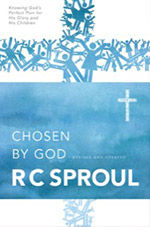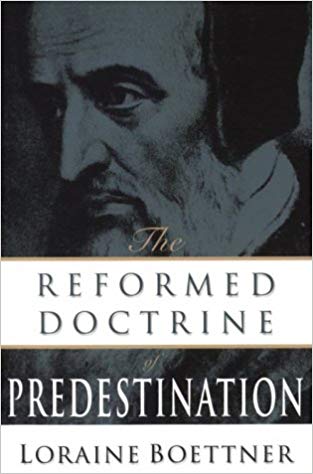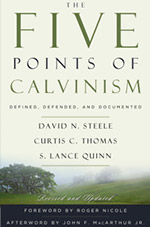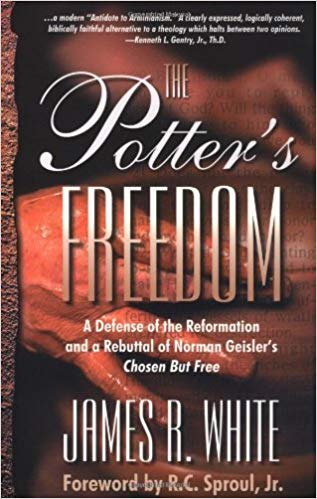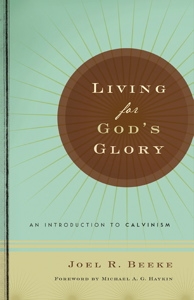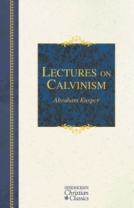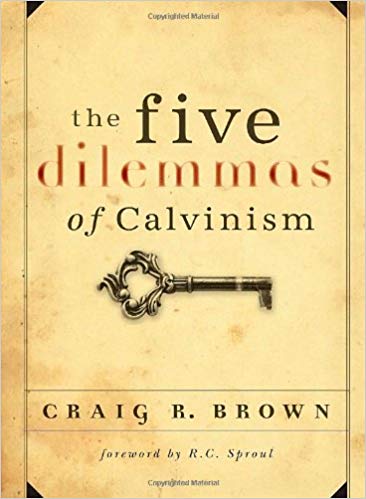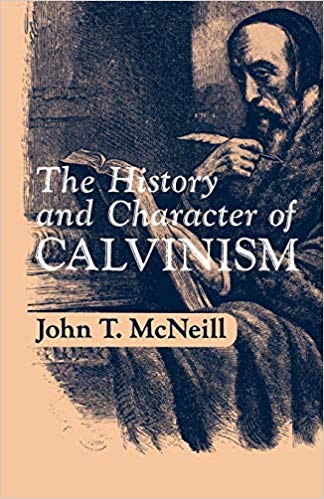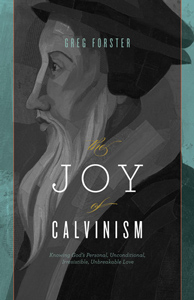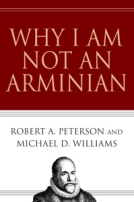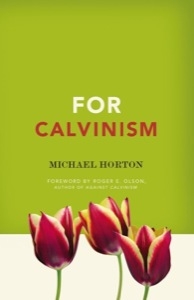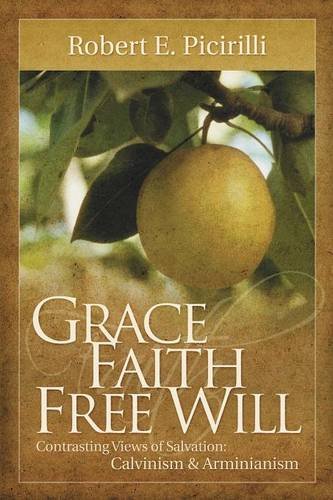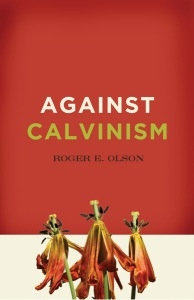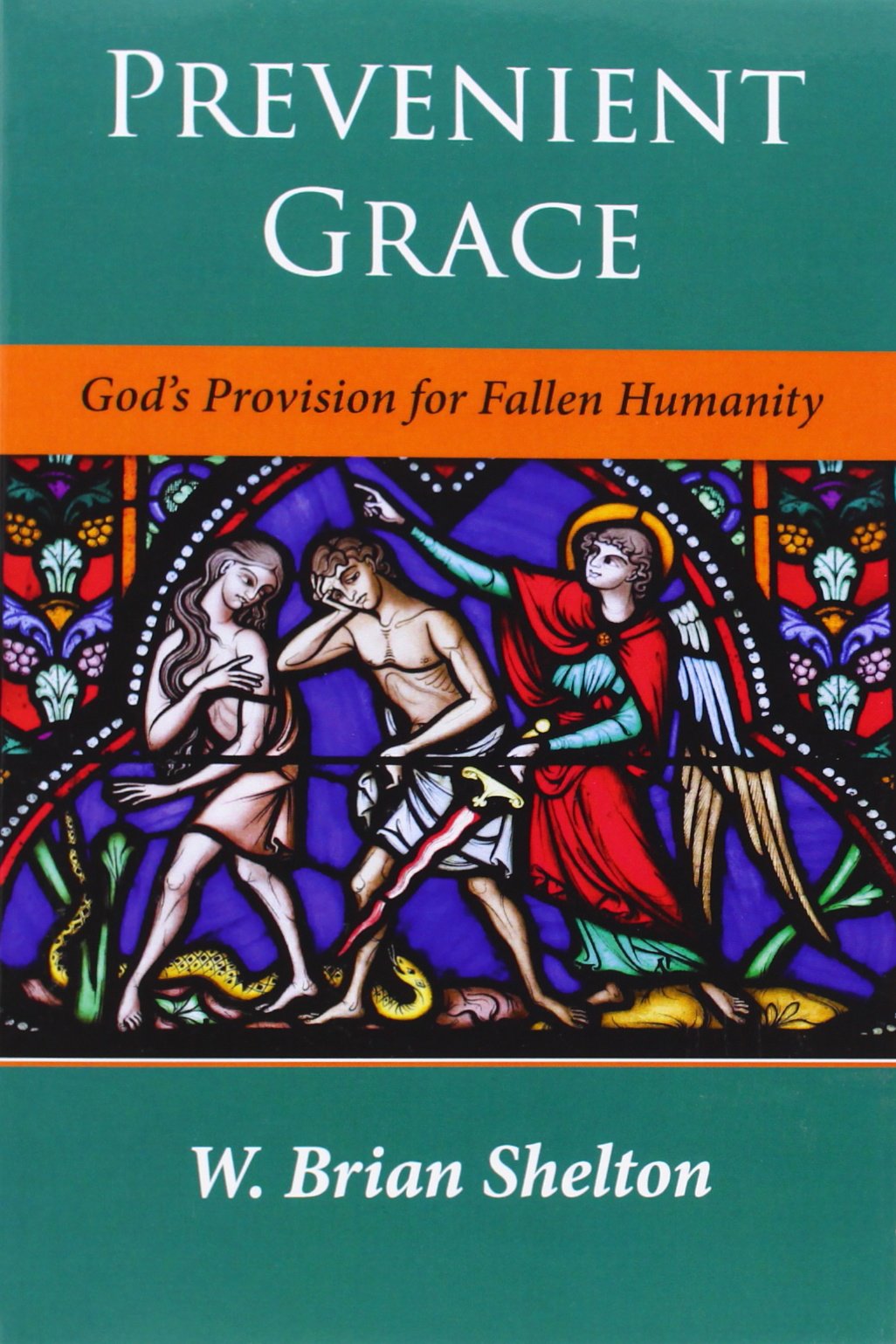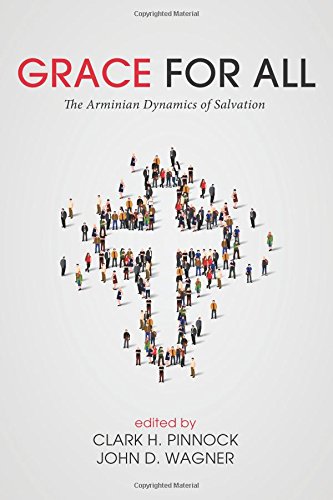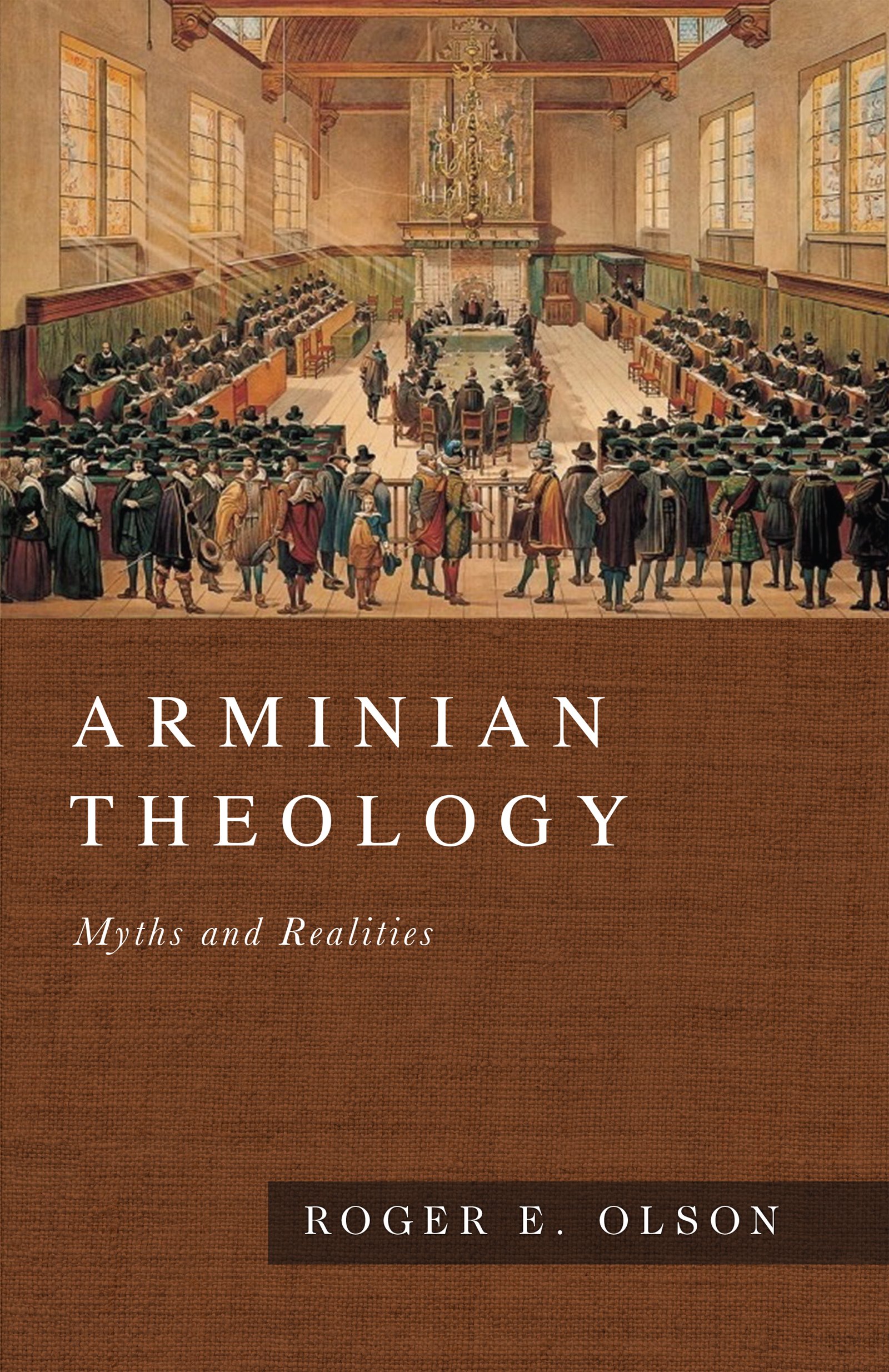Some time ago a novel appeared with an historical background. It concerned the period of the Revolutionary War when the American Colonies were fighting for their independence from the British Empire. One of the characters in the story was described by the author as a hard, cruel, vindictive person. The author portrayed him as mean and surly, the type who is repulsive to all who know him. Then followed a sentence which will incense all adherents of the Reformed Faith. The author remarked of this repulsive fellow: “He was a typical early American Calvinist.”
Those who do much contemporary reading will know that the attitude of this author is all too common. The Puritan Fathers who gave birth to this nation, who founded this great and blessed democracy which is the last stronghold of religious freedom in the world, are often vilified and ridiculed by modem day authors who are not fit to unlatch the boot straps of the Puritan Fathers.
This attitude of derision toward the Calvinistic or Reformed Faith is by no means confined to generations past. It is current today. One small example came to light as I visited in the home of a new resident in the community. This family had begun to attend the worship services of the Reformed Church. When a neighbor learned of it she said, “But surely you have nothing in common with those narrow-minded people.” Those narrow-minded people!
Well, there was some little truth in that remark. We are narrow-minded, just as narrow as the Word of God but also just as broad. We are as narrow as the will of God, and at the same time, just as broad. We are as narrow as the grace of God, and at the same time, just as broad.
But what is it that evokes the hatred, the vilification, the foul venom of the world? Basically, there is but one answer: Everything which the Christian believes is repulsive to the unregenerate world. Paul laid his finger on the heart of the matter when he said, ‘The cross is to the Jew a stumbling block and to the Greek foolishness”; it is only to us who believe that it is “the power of God unto salvation.”
One might ask: “Is this not true of all churches? Does not the world of unbelief hate all churches for the same reason?” In a limited way that is true. The world will hate any church which is truly a church. I recall speaking with a school teacher whose religious thinking could be classified only as “unitarian.” He was employed in the school system of a small community in which the Lutheran Church was the dominant church. This man hated the Lutheran Church with a terrible, unreasoning hatred. Why? Because the people of the Lutheran Church forcibly remonstrated with him when he sought to undermine the faith of their children.
We can well understand the position of these Lutheran parents. We, too, would protect the faith of our children. And we can understand their position the better, because we hold the basic essentials of the Christian Faith in common with the whole of Historic Protestantism. But rather than seeking to discuss the attitude of the unregenerate world toward the whole Christian community, let us consider our own specific situation within the Reformed Faith. What is it about churches of the Reformed persuasion which evokes the hatred, the ridicule, the sarcasm, and the venom of the unregenerate world?
The answer is that the Reformed Church preaches and teaches some “terrible truths,” terrible to the mind of the unregenerate man, and terrible to many superficial folk who claim to be Christian. I shall place these “terrible truths” before you, recounting them one by one. It may be that these truths will seem terrible to some of you. If so, it may be that what you need is to be converted. Or if it be true that you are a child of God, it may be that you are in need of sanctifying grace to accept the full truth of the Word of God. What, then, are these “terrible truths”?
First, the Reformed Faith declares that man is a sinner. And so he is, for the Word of God declares of the race of men, “There is none righteous, no, not one” (Romans 3:10). Again, we read, “If a man says that he has no sin, he is a liar and the truth is not in him” (I John. 1:8). More yet, the Word of God declares that this sinful condition of man is a complete and absolute one, for the Scriptures point out that the “carnal mind is enmity against God; it is not subject to the law of God, neither indeed can it be; so then they that are in the flesh cannot please God” (Rom. 8:7-8).
Note the scope of this statement. They that are in the flesh cannot please God! The natural man, the unregenerate man, the man who has not been born again, cannot please God. There is nothing in the natural man which pleases God; nothing the natural man does pleases God. Thus is rejected the popular notion that man has within him a mixture of righteousness and evil, that he is partly bad, but also partly good. He cannot please God. The Belgic Confession of Faith declares that man is by nature “wicked, perverse and corrupt in all his ways.” The Canons of Dort point out that the natural man is totally depraved.
In the language of the Canons, “. . . all men are conceived in sin, and are by nature children of wrath, incapable of any saving good, prone to evil, dead in sin, and in bondage thereto; and, without the regenerating grace of the Holy Spirit, they are neither able nor willing to return to God, to reform the depravity of their nature, nor to dispose themselves to reformation.” Third and Fourth Heads of Doctrine, Art. III.
Paul provides the reason for all this. He points out that the unsaved man is “dead in trespasses and sin.” The unsaved man is not merely ill. He is not merely diseased. He is not merely impaired. He is dead, dead in trespasses and sin. The natural man is a spiritual corpse; therefore, they that are in the flesh cannot please God.
One might ask: “But do not all Christian churches teach this basic truth?” Unfortunately, the answer is “No.” The preaching of many churches is based upon the concept that human nature has not been corrupted, at least not seriously corrupted, by sin. This is the concept which underlies all preaching to the effect that a man may bring himself to salvation.
Such thinking disregards the plain declaration of Scripture (Rom. 3:11), “There is none that seeketh after God.” It likewise disregards the Word of Christ when He said, “Ye will not come unto me that ye may have life” (John 5:40). Further, it disregards the Word of Christ when He said, “No man can come unto me, except the Father which sent me, draw him” (John 6:44). “Ye will not come unto me . . . No man can come unto me, except the Father which sent me, draw him.”
Thus, the Reformed Faith declares not only that the natural man is lost, but that he is hopelessly and helplessly lost. He is so hopelessly and helplessly lost that only God can save him. This is the first terrible truth which the Reformed Church teaches: Man is a sinner whom only God can save.
For this, proponents of the Reformed Faith have sometimes been vilified, criticized and condemned. Like the prophet Micaiah, who was hated of the wicked king Ahab, because he “never prophesied good” concerning him but “always evil,” so the Reformed Faith is hated by all those who will not see themselves for what they are: hopeless, helpless sinners whom only God can save.
The second “terrible truth” which the Reformed Faith sets forth is that God is upon the throne. God is upon the throne! Calvinism exalts God. It not only lowers man and his works into the dust, but it presents God as God.
The Reformed Faith declares that God is not ruled by anything which man may desire or want or hope or fear, but by His own good pleasure. We confess along with the Psalmist of old (115:3), “Our God is in the heaven; he hath done whatsoever he hath pleased.”
This doctrine is repulsive not only to the world but, significantly enough, to many who profess to be the children of God. They particularly resent its implications for the whole matter of salvation. They desire that man shall be the central figure in the matter of salvation. They declare that man and man alone must determine whether he will be saved.
How easily they disregard the Word of God which declares, “For as the Father raised up the dead and quickeneth them, even so the Son quickeneth [makes alive] whom he will” (John 5:21). They refuse to believe that it is not the will of man but the will of God which is determinative in the matter of salvation. They will not believe that God “worketh all things after the counsel of his own will” (Eph. 1:11).
“To those who murmur at the free grace of election, and just severity of reprobation, we answer with the Apostle: ‘Nay but, O man, who art thou that repliest against God?’ (Rom. 9:20); and quote the language of our Savior: ‘Is it not lawful for me to do what I will with mine own?’ (Matt. 20:15). And therefore with holy adoration of these mysteries, we exclaim, in the words of the Apostle: ‘O the depth of the riches both of the wisdom and knowledge of God! How unsearchable are his judgments, and his ways past finding out! For who hath known the mind of the Lord, or who hath been his counselor? Or who hath first given to him, and it shall be recompensed unto him again? For of him, and through him, and to him are all things: to whom be glory forever. Amen’ (Rom. 11:33-36).” First Head of Doctrine, Art. XVIII.
Then the Reformed Faith declares a third “terrible truth.” The Reformed Faith declares that Christ died to save His people from their sins. This is precisely what the angel Gabriel said. ‘Thou shalt call his name Jesus, for he shall save his people from their sins.” Take note of the emphasis. The angel Gabriel did not say that He should save all people from their sin. On the contrary, Gabriel said that He should save His people from their sin (Matt. 1:21).
Jesus declared the same truth when He said of Himself, “I lay down my life for the sheep” (John 10: 15). But the world is not populated solely with sheep. The world is not even primarily populated with sheep. On the contrary, we learn that in the day of judgment the whole human race shall be divided into two great bodies, the one made up of the “sheep,” the other made up of the “goats.” And Jesus said, “I lay down my life for the sheep.”
We know that all men are not saved; yet, the Arminian tells us that Christ died for all men. This can only mean that the death of Christ does not truly save. It can only mean that Christ did not really “bear in his own body our sin.” It can only mean that Christ did not truly pay the full price of sin.
Why is this so? Because if Christ did pay the price of sin, then we are no longer under the condemnation of God. This is what Paul said, “There is now therefore no condemnation to them which are in Christ Jesus” (Rom. 8:1). God does not exact a double price for sin. God does not demand that two men shall die to pay the price of sin for one. If, therefore, Christ died for me, paying the price of my sin, there is no more price to be paid. I am free. I am no longer under the condemnation of God.
“The death of the Son of God is the only and most perfect sacrifice and satisfaction for sin; is of infinite worth and value, abundantly sufficient to expiate the sins of the whole world.” This we must maintain even as does the Word of God, but again, we must understand it in the light of the whole Word which also makes dear that “this was the sovereign counsel and most gracious will and purpose of God the Father, that the quickening and saving efficacy of the most precious death of his Son should extend to all the elect,” and to them only, for he bestows “upon them alone the gift of justifying faith.” Second Head of Doctrine, Arts. III & VIII.
This, therefore, is the third “terrible truth” set forth by the Reformed Faith: That Christ did not die in vain; that His death truly saves; that His death really paid the price of sin; that His death was a perfect death; that His sacrifice was a perfect sacrifice; that the price of sin is paid once and forever.
The fourth “terrible truth” which is declared by the Reformed Faith is that man can be saved only by the action of the Holy Spirit. We believe that only the Holy Spirit can work that miracle in the human heart whereby we are born again. And this is precisely what Jesus said, for in the Gospel according to John we read, “It is the Spirit which giveth life. . . . No man can come unto me except it be given him of the Father” (6:63-65).
You have perhaps heard numerous sermons on the familiar text, taken from the conversation of Jesus with Nicodemus, when Jesus said, “Ye must be born again.” Jesus also declared to Nicodemus, “Except a man be born of water and the Spirit, he cannot enter into the kingdom of God” (John 3:3-8). But how does the new birth come to pass? How does a man come to be born again of the Spirit? Here again the Word of God: “Who were born, not of blood, nor of the will of the flesh, nor of the will of man, but of God” (John 1:13). Not of the will of man! What a stumbling block these words have proved to many. Not of the will of man! They smash human pride to the ground. They bury human egotism in the dust.
It was not my will that I should be saved, but God’s will. “Ye have not chosen me,” said Jesus, “But I have chosen you.” Or as John puts it in his epistle, ‘We love him only because he first loved us.”
“The manner of this operation can not be fully comprehended by believers in this life. Notwithstanding which, they rest satisfied with knowing and experiencing that by this grace of God they are enabled to believe with the heart and to love their Saviour.” Third and Fourth Heads of Doctrine, Art. XIII.
If I have come under the conviction of my sin, it is because the Holy Spirit hath wrought that conviction in my heart. If I have been led to repent of my sin, it is the Holy Spirit who hath led me to repentance. If I have faith within my heart, it is because the Holy Spirit hath put that faith within my heart. Therefore, I can have no pride. I cannot boast of the fact that I know my sin and repent of it; only the Holy Spirit could make me to know it and afford the grace necessary to repentance (John 16:7-11). I cannot take pride in my faith, for if there be faith in my heart to believe in the person and work of Jesus Christ, it is the gift of God (Eph. 2:8).
All that is left for me to do is to sing the beloved old hymn:
When I survey the wondrous cross,
On which the Prince of Glory died,
My richest gain I count but loss,
And pour contempt on all my pride.
Forbid it, Lord, that I should boast,
Save in the death of Christ, my Lord,
All the vain things which charm me most,
I sacrifice them to His blood.
There you have it. “Forbid it, Lord, that I should boast. Pour contempt on all my pride.” Oh, this is hard for man to do. He wants to feel that he has had a part in his own salvation.
This is the fourth “terrible truth” set forth by the Reformed Faith. The Reformed Faith declares that the Holy Spirit of God is responsible and solely responsible for accomplishing the work of redemption in our lives. Therefore, we give to God all the glory, both now and forever more. With the apostle we say, “Let our glorying be in the Lord” and in what He hath wrought, and in what He hath done for us.
The Reformed Faith declares a fifth “terrible truth.” The Reformed Faith declares that we are saved by grace and grace alone. This is the great principle on which Martin Luther broke from the Church of Rome: Salvation by grace through faith alone.
We believe that our salvation is the gift of God, the free, unmerited gift of God. We do not believe that we are saved by anything that we have done, nor anything that we do, nor anything that we shall ever do. Our salvation is not of works, said Paul, lest any man should boast. Neither do we believe that we are saved by anything which we believe. We must believe; we must have faith; but we cannot take personal credit even for our faith, for even our faith is the gift of God.
Surely this is the explicit teaching of the Scriptures. Consider that familiar text, Romans 6:23, ‘The wages of sin is death, but the gift of God is eternal life through Jesus Christ our Lord.” The gift of God is eternal life. And Paul declares the whole matter in these words: “By grace are ye saved through faith, and that not of yourselves; it is the gift of God, not of works, lest any man should boast” (Eph. 2:8). Hear these words with care. “By grace are ye saved through faith, and that not of yourselves; it is the gift of God.”
Therefore, our creed states “. . . this grace of regeneration does not treat men as senseless stocks and blocks, nor take away their will and its properties, neither does violence thereto; but spiritually quickens, heals, corrects, and at the same time sweetly and powerfully bends it, that where carnal rebellion and resistance formerly prevailed a ready and sincere spiritual obedience begins to reign; in which the true and spiritual restoration and freedom of our will consist. Wherefore, unless the admirable Author of every good work wrought in us, man could have no hope of recovering from his fall by his own free will, by the abuse of which, in a state of innocence, he plunged himself into ruin.” Third and Fourth Heads of Doctrine, Art. XVI.
What shall we say, then, of our salvation? We shall say, along with the Word of God, that “God is the author and the finisher of our faith.” We shall say of the whole matter of our salvation: It is the gift of God. To God be all the glory.
Finally, the Reformed Faith declares a last “terrible truth,” a “dangerous truth.” The Reformed Faith declares to the believer that God is faithful, that He will never forsake His own. The Reformed Faith dares to believe the Word of God when He declares, “My grace is sufficient for thee.” The Reformed Faith dares to say with Paul, “I know in whom I have believed and am persuaded that he is able to keep that which I have committed unto him against that day” (II Tim. 1:12). The Reformed Faith dares to say with Paul, “For I am persuaded that neither death nor life, nor angels, nor principalities, nor things present, nor things to come, nor powers, nor height, nor depth, nor any other creature, shall be able to separate us from the love of God which is in Christ Jesus, our Lord” (Rom. 8:38-39).
To be certain “the carnal mind is unable to comprehend this doctrine of the perseverance of the saints, and the certainty thereof, which God hath most abundantly revealed in his Word, for the glory of his name and the consolation of pious souls, and which he impresses upon the hearts of the faithful. Satan abhors it; the world ridicules it; the ignorant and hypocrite abuse, and heretics oppose it. But the spouse of Christ hath always most tenderly loved and constantly defended it, as an inestimable treasure; and God, against whom neither counsel nor strength can prevail, will dispose her to continue this conduct to the end. Now to this one God, Father, Son, and Holy Spirit be honor and glory forever. Amen.” Fifth Head of Doctrine, Art. XV.
This, beloved, is that “terrible Reformed Faith,” the faith which dares to believe that “God is the author and the finisher” of our redemption. This is the faith which evokes the hate and venom of the unregenerate world and of the Arminian Church. This is the faith which causes the irresponsible to berate those who dare to receive the whole counsel of God at its face value.
And this is the faith which has caused the Reformed Church in America to become one of the great missionary churches of all time. If you are conversant with the history of foreign missions, you know that, of course. You know that there are few churches, few denominations, which have sent forth so many to the mission fields of the world in proportion to their membership.
This is a significant fact to be remembered when you hear men say, “If I believed these things, if I believed in an unconditional election, if I believed in a limited atonement, if I believed in an irresistible grace, I would lose all my missionary zeal.”
Two replies should be made to that irresponsible remark. First, if knowing the truth of God can cause any man to lose his zeal, he had better lose it. Any zeal, any fervor which is born of ignorance of the Word of God is not worth having.
But secondly, it is precisely because we believe in these things that the Reformed Church is a great missionary church. We know from the Word of God that God has His own in “every tongue and tribe and nation and people.” We know that the preaching of the Word is the divinely appointed means whereby God calls them out of the darkness and into the light. We know that God will not allow His Word to return unto Him void. We know that if we are faithful in proclaiming the Gospel, God will claim His own. Therefore, we go forth into all the world, into every tongue and tribe and nation and people, confident, even as the apostle said, that our “labor is not in vain.”
So there you have it, beloved; that “terrible faith” which issues forth to the glory of God.
We see God even as the prophet Isaiah saw Him, high and lifted up, seated upon the throne, His train filling the temple. We hear the voices of the seraphim and the cherubim as they cry: “Holy, holy, holy, is the Lord God of hosts; the whole earth is full of his glory.”
We see man, even as he is seen in the Word of God: a child of wrath, justly under the condemnation of God, hopelessly, helplessly lost, dead in trespasses and sin, forever lost except for the mercy and love of God.
We see Christ as He is presented in the Scriptures, upon the cross, dying a victorious death, making the perfect sacrifice for sin, once and forever, saving us by that death.
We confess that we are eternally indebted to the Holy Spirit, that only the Holy Spirit of God could show us the infamy of our sin and convict us of it, that only the Holy Spirit could implant a new life within us, that only the Holy Spirit could inspire the faith of God within our hearts.
We confess that our salvation is the gift of God, the free, unmerited gift of God. We confess that God could find no good thing in us. We confess that we have not and could not have earned our salvation; it is the magnanimous gift of a gracious God.
Finally, we confess that we have faith in the promises of God; we confess that we trust in the faithfulness of God. We confess that we know Him in whom we have believed and are persuaded that He is able to keep that which we have committed unto Him against that day. We stand upon the promises of God.
Standing on the promises of Christ, my King,
Through eternal ages let His praises ring;
Glory, hallelujah, I will shout and sing,
Standing on the promises of God.
Perhaps, by this time, you have come to say, “But these ‘terrible truths’ are not terrible at all. They are wonderful truths! This is nothing more nor less than the historic Christian Faith as it has been known and believed by millions across the centuries. This is not a new faith; this is not a strange faith; this is not a man-made faith. This is the ‘faith once for all delivered to the saints’ as it is set forth in the Word of God.” Of course it is! This is the faith of the apostles, the faith of the Apostolic Church of the first century, the faith which was recovered in the Protestant Reformation.
If this is the testimony of your heart, join with all those who through the ages have confessed: But I am persuaded that God is the author and the finisher of our redemption, that what He determined from before the foundations of the world He will bring to a triumphant conclusion in that last day, that the Lamb of God standing as though slain shall see of the travail of His soul and shall be satisfied, that “neither death, nor life, nor angels, nor principalities, nor things present, nor things to come, nor powers, nor height, nor depth, nor any other creature, shall be able to separate us from the love of God, which is in Christ Jesus our Lord.”
Praise God from whom all blessings flow,
Praise Him all creatures here below,
Praise Him above, ye heavenly host,
Praise Father, Son, and Holy Ghost.
Author
Rev. Gordon Girod was pastor of Seventh Reformed Church in Grand Rapids, Michigan for many years. This article was taken from his book, The Deeper Faith which is a short compendium on the Canons of the Synod of Dort.
